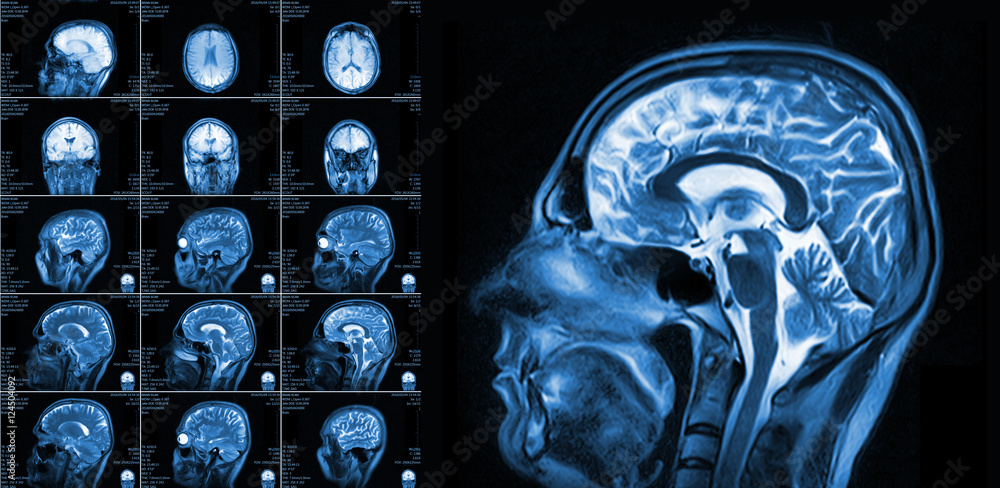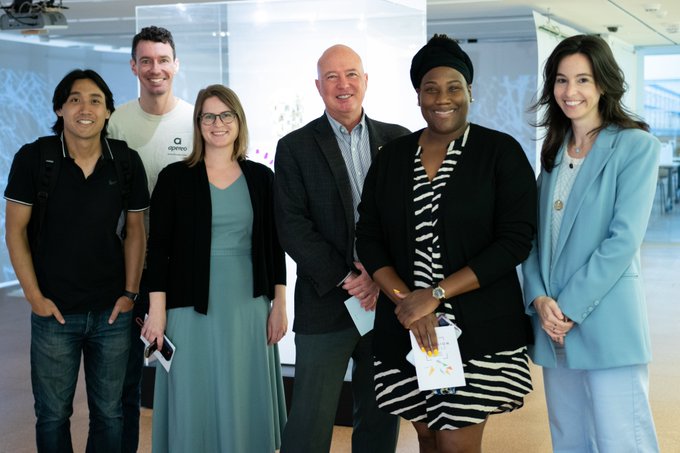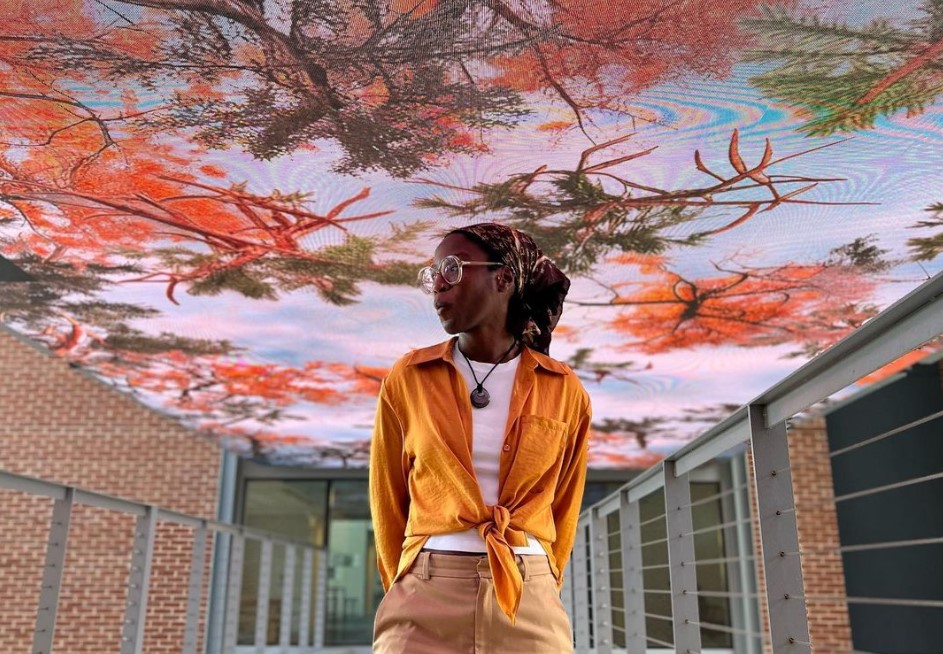2024 C21U Impact Report

Collaboration
Developing a New Learning Model Based on Neuroscience
From 2022 to 2023, C21U Executive Director Steve Harmon, Director of Research in Education Innovation Jonna Lee, and Research Scientist Meryem Yilmaz Soylu collaborated with Eric Schumacher, a professor at Georgia Tech School of Psychology, to study the relationships between instructional design models, brain activities, learning outcomes, and engagement levels to advance our understanding of how the human brain responds to different instructional elements.
The team collected data from student participants over two sessions. During the first session, participants were observed watching instructional videos in an fMRI* machine while periodically providing engagement ratings. Afterward, they completed a memory test related to the content. Approximately one week later, in the second session, participants completed the memory test and re-watched the videos, using a wheel mouse to rate their engagement. Various statistical methods, including the General Linear Model, t-tests, and chi-square tests, were employed to analyze changes in brain activation and examine memory test results and engagement levels. This comprehensive approach ensured the thoroughness and reliability of our findings.
The study's results show how various instructional events can enhance stimuli processing and memory consolidation in online learning contexts. Additionally, it contributed to developing a new learning model based on neuroscience. Meryem Yilmaz Soylu, C21U’s research scientist, presented initial findings at the 2022 International Mind, Brain, and Education Society (IMBES) conference and the latest at the 2024 DTL SOLAR conference.
*Functional Magnetic Resonance Imaging (fMRI) is a neuroimaging technique that measures brain activity by detecting changes in blood flow.


GT-Microsoft Accessibility Grant
In 2021, Georgia Tech’s Office of Information Technology and C21U partnered with Microsoft to issue a call for proposals for the GT-Microsoft Accessibility Research Seed Grant program. Proposals were sought in education accessibility with three different tracks: digital accessibility/assistive technology, diverse student backgrounds, and campus life. All Georgia Tech faculty, staff, and students were invited to apply. C21U executed the grant program, during which they convened a proposal review committee to select and fund four transformative projects. In March 2022, we hosted a project review meeting where awardees presented their work and progress and participated in a Q&A session with the Microsoft team.
Projects Funded
Designing a Computer Science + Music Learning Environment for Visually Impaired Students led by PI research scientists Stephen Garrett and Jason Freeman, professor and Chair of the School of Music, and Brian Magerko, director of graduate studies and professor of digital media of the Ivan Allen College of Liberal Arts. From 2021 to 2022, the study explored the needs of visually impaired students in computer science classes and how EarSketch software and curriculum could be redesigned for them. Six participants with no functional vision or low vision participated in this user experience (UX) study.
Mentoring Platforms to Support Research Experiences for Students with Disabilities led by PI Maureen Linden, Center for Inclusive Design and Innovation executive director, Nathan Moon Center for Advanced Communications Policy principal research scientist, and former graduate research assistant Beverly Vaz. The project aimed to determine the needs of students with disabilities (SwD) involved in undergraduate research related to participation in mentorship programs. In examining these needs, they studied mentoring topics and communication styles to identify design specifications for developing an online community of practice that would support SwD in STEM fields. The research, conducted in 2022, based its findings on qualitative interviews of post-secondary students, including online, in-person, and neurodivergent students.
Accessible exhibits at the intersection of art, science, and technology led by PI College of Computing event coordinator Birney Robert comprised two exhibits. The first, Extension of Self: What it Means to be Human in a Digital World, ran from August 8 to October 14, 2022, while the second, Extension of Community: What It Means to be Sustainable in a Digital World, ran from August 21 to November 12, 2023. The exhibits, which included artists' talks, sought to make the three disciplines more accessible to the Georgia Tech and Atlanta communities by contextualizing STEM through art.
Accessible and Equitable Learning in a Quasi-Post Pandemic World led by Yakut Gazi, former associate dean of Learning Systems at Georgia Tech Professional Education (GTPE), along with Chaohua Ou, former assistant director of learning and technology initiatives for the Center for Teaching and Learning (CTL); Matt Lisle former C21U director of digital learning technologies, and Warren Goetzel, current director of academic technologies at the Office of Information Technology. With the support of Microsoft, the project team hosted a 3-day virtual summit for more than 100 participants in Fall 2022. The summit facilitated discussion and collaboration to explore how digital accessibility tools and best practices could be leveraged to address access, equity, and inclusion issues from a universal design perspective.



Building a Digital Credentials Structure for Georgia Tech
Georgia Tech presently does not have a centralized digital credentials platform or ecosystem. In a move to support open source and decentralized, community-developed ecosystem of digital credentials, the digital learning technologies team devoted resources as a founding member of the Digital Credentials Consortium to help develop and implement digital credentials, first as blockcerts, in 2021, using blockchain technology, then pivoting to W3C’s Verifiable-Credentials platform and 1EdTech’s OpenBadges v3 specification in 2022. This solution served to understand the future state of digital credential ownership and potential user experience issues and scaffolds needed for learners to understand and value their digital credentials skills, as well as understand a more extensive, campuswide implementation approach that prioritizes strategy and governance.
In 2023, we partnered with the GTPE project management program, the Center for Inclusive Design and Innovation (CIDI), and the School of Psychology AccessCORPS VIP team to pilot the verifiable credentials Canvas tool and Learner Credential Wallet app. By the 2024 spring semester, our team began development on integrations with the Consortium’s upcoming “admin dashboard,” a digital credential self-service application, and finalized adherence to and innovations in 1EdTech’s Open Badges v3 final specification. Additionally, the team began to research the present and future needs of Georgia Tech constituents for digital credentials, bringing together a campuswide cohort of academic and professional development leaders to introduce and situate Tech’s digital credentials efforts, as well as conducting a thorough technology audit scheduled for completion in summer 2024. This audit and cohort organization is expected to establish a strategic direction on digital credentials that will positively impact our primary end-users – our learners, by providing a campuswide, equitable, sustainable model for digital credentials.
This project has also provided C21U’s graduate research assistants (GRA) with opportunities to learn more about digital credentials and conducting research. That is the case of former GRA Yugvir Parhar, who shared that working with us on this project was an impactful experience that helped him land his current position as a UX researcher. “Seeing people working with just credentials in the actual industry and making it work with their use cases was really inspiring,” Yugvir explained. During his time at C21U, Yugvir was instrumental in developing fundamental work to understand the dynamic needs of various stakeholders, including students, instructors, and employers, while improving the design of the digital credentialing tool.
Eric Sembrat, Warren Goetzel, Stuart Freeman, Jonna Lee, and Meryem Yilmaz Soylu shared their work in 2024 at the UPCEA Annual Conference and Digital Credentials Summit.


Georgia Tech Atrium
As part of Tech's Strategic Plan for 2020-30, GT Atrium has been named a cornerstone initiative for the next decade of institutional development. C21U has been leading this project's path to become a reality since its conception, including user experience research to develop use cases for programming, outlining high-level implementation phases and goals, and developing onboarding and training resources for future staff and a website prototype. We also produced a comprehensive concept report for the Institute’s leadership and stakeholders, including a competitive analysis and business model.
Since GT Atrium’s conception, top Georgia Tech administrative leaders have served on an advisory board. These are Steve Harmon, executive director of C21U; Nelson Baker, interim dean of Lifetime Learning; Bernard Kippelen, vice provost for International Initiatives; David Bridges, vice president of Enterprise Innovation Institute; Tanesha Steward, director of the Office of Affiliated Organizations; Janet Kinard, vice president of Engagement, Georgia Tech Alumni Association; and Zellie Duvall, associate director of Federal Relations.
On July 1, 2024, we welcomed Dilruk De Silva as the new global operations director for the GT Atrium initiative. In this role, he will oversee a broad spectrum of operations and provide the leadership needed to ensure the Atrium's global operations continue to thrive, underscoring our commitment to international collaboration and excellence.
The Institute will announce its first Atrium, which will be in the state of Georgia, in the Fall 2024 semester.

C21U Leads in Educational Technology and Innovation
C21U leads the Institute’s thought leadership on educational technology through its ownership and presence in the Educational Technology Steering Committee (ETSC) and the Education Innovation Council (EIC). Both communities facilitate a collaborative space for discussions, initiatives, pilots, and knowledge-sharing on ever-evolving educational technologies. EIC is presently led by our executive director, Steve Harmon.
Established by C21U, the Educational Technology Steering Committee (ETSC) serves as a networking hub for people around Georgia Tech involved in education technology-related projects. Our members include the Division of Lifetime Learning staff, each Tech academic unit, the Administrative Services Center (ASC), the Office of Information Technology (OIT), and Research. From 2021 to 2023, ESTC has strategized, executed, and evaluated the instructional changes and evolutions required by the COVID-19 pandemic and instructional delivery, facilitated a closer integration with the campus Learning Management System (LMS) and enterprise services virtual and remote learning opportunities, created and adhered to Canvas Privacy Data Services, implemented a Learning Data Retention Policy, and consolidated and documented Georgia Tech's contributions to educational technology professional organizations.
With the arrival of Generative AI in early 2023, C21U was instrumental in developing research, policy, and education on the usage and situational risks and benefits of generative AI technologies. Our Director of Digital Learning Technologies, Eric Sembrat, spearheaded the development of a collaborative working group with experts in information technology to establish best practices, generative AI guidance, and service provider updates in concert with legal recommendations from Georgia Tech's General Counsel and Cyber Security. Eric presented on generative AI to campus communicators to guide the development of storytelling and editorial guidance, IT professionals for understanding the tool ecosystems and strategies for programming and work automation opportunities, and on a panel for the ai4Libraries event to situate the value and opportunities of the technology to hundreds of librarians across the world. Adrian Gallard, C21U’s digital learning data analyst, focused his data science expertise on generative AI. He assessed a swath of generative technologies upon data extraction and evaluation projects to understand prompt optimizations, training challenges and opportunities, and efficiency gains for conducting qualitative data analysis and extraction at scale for campus audiences.
Also, in 2023, Eric served as a subject matter expert during Georgia Tech’s evaluation of its digital user experience, specifically focusing on the gains our educational technology tools, projects, and integrations can make to evolve with the output.

AI Application for Lifetime Learning in the Workforce
In today’s dynamic work environment, lifetime learning has become essential for individuals navigating shifting job markets. C21U staff, including our Executive Director, Steve Harmon; Jonna Lee, director of research in education innovation; Ashok Goel, chief scientist, and Matt Lisle, former director of digital learning technologies, collaborated on SkillSync, a 2022 NSF-funded effort project led by EduWorks, Georgia Tech, the University System of Georgia, Credentials Engine, and various other partners.
The project aimed to develop an artificial intelligence (AI) application to streamline the expression of reskilling needs for companies and assist higher education institutions in articulating their educational offerings. Jonna provided research support for implementing a human-centered and participatory research design and contributed to designing the AI chatbot coach AskJill, which was integrated into the SkillSync platform. Based on Georgia Tech’s assistant Jill Watson, employers and educators can ask questions to the virtual coach, replacing a traditional manual project with an application that allows companies and colleges to find and design programs according to their present and future needs.
C21U’s participation in the AskJill project exemplifies the intersection of technology, research, and education. Besides being a practical tool for higher education institutions and employers, the platform holds immense potential to empower learners by bridging the gap between job requirements and lifelong learning opportunities.
